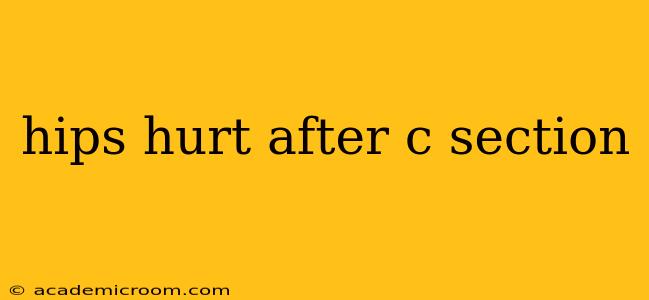Experiencing hip pain after a c-section is more common than you might think. While the incision itself is the primary focus post-surgery, the strain on your body during pregnancy, labor, and the surgical procedure itself can lead to discomfort and pain in your hips. This comprehensive guide will delve into the reasons behind this pain, explore potential solutions, and answer frequently asked questions.
Why Do My Hips Hurt After a C-Section?
Several factors contribute to hip pain following a c-section:
-
Hormonal Changes: Pregnancy significantly alters hormone levels, influencing ligament laxity. This means your ligaments become more relaxed and stretchy, potentially leading to instability in your joints, including your hips. This laxity doesn't always fully resolve after delivery, contributing to post-c-section hip pain.
-
Postural Changes: During pregnancy, your center of gravity shifts, forcing postural adjustments that can strain your hips and lower back. These changes can persist postpartum, exacerbating existing discomfort or creating new pain points.
-
Muscle Weakness: The physical demands of pregnancy and childbirth can weaken core and hip muscles. Weak muscles offer less support to your joints, making them more susceptible to pain and injury.
-
Surgical Stress: The c-section itself can put stress on your pelvic joints. The position during surgery, the anesthesia, and the overall physical trauma can contribute to hip discomfort.
-
Scar Tissue: Scar tissue formation from the incision can sometimes restrict movement and cause pain that radiates to surrounding areas, including the hips.
-
Referred Pain: Pain originating from other areas, such as the lower back or abdomen, can sometimes be felt in the hips. This is known as referred pain.
How Long Does Hip Pain After a C-Section Last?
The duration of hip pain varies greatly among individuals. For some, the pain might subside within a few weeks, while others may experience it for several months or even longer. The severity of the pain and its duration depend on factors like the individual's pre-existing conditions, physical fitness levels, and the effectiveness of pain management strategies. Consistent physical therapy and proper self-care can significantly impact recovery time.
What Can I Do to Relieve Hip Pain After a C-Section?
Managing hip pain after a c-section requires a multi-pronged approach:
-
Rest and Relaxation: Adequate rest is crucial for healing. Avoid strenuous activities and listen to your body's signals.
-
Gentle Movement: Light exercise, such as walking (short distances initially), can improve circulation and prevent stiffness. Avoid high-impact activities.
-
Physical Therapy: A physical therapist can provide personalized exercises to strengthen core and hip muscles, improve posture, and address any mobility limitations.
-
Pain Medication: Your doctor may prescribe pain relievers to manage discomfort. Always follow their instructions carefully.
-
Heat and Ice: Applying heat or ice packs to the affected area can provide temporary relief. Experiment to determine which method works best for you.
-
Posture Correction: Pay attention to your posture throughout the day. Maintain good posture while sitting, standing, and lying down.
-
Support Belts: A postpartum support belt can provide additional support to your abdominal muscles and potentially reduce hip strain.
Is Hip Pain After a C-Section Normal?
While some level of discomfort is common after a c-section, persistent or severe hip pain warrants medical attention. It's crucial to discuss your symptoms with your doctor or a physical therapist to rule out any underlying conditions and receive appropriate treatment.
Can Physical Therapy Help with Hip Pain After a C-Section?
Yes, physical therapy is often highly beneficial in managing hip pain after a c-section. A physical therapist can assess your individual needs, design a personalized exercise program, and provide manual therapy techniques to improve mobility, reduce pain, and promote healing.
When Should I See a Doctor About My Hip Pain After a C-Section?
Consult your doctor if your hip pain is severe, persistent, worsening, or accompanied by other symptoms such as fever, excessive swelling, or numbness. Don't hesitate to seek professional medical advice to ensure proper diagnosis and treatment.
Disclaimer: This information is for general knowledge and informational purposes only, and does not constitute medical advice. Always consult with a qualified healthcare professional for any health concerns or before making any decisions related to your health or treatment.
